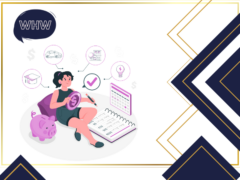5 Ways to Tackle Financial Stress

Ever felt that nagging tension when bills pile up or when the bank balance doesn’t quite cover upcoming expenses? That’s financial stress, a growing concern for many as living costs climb and economic uncertainties loom. But why exactly should we care about getting a grip on this kind of stress? Well, beyond keeping your finances in check, managing this stress is crucial for overall well-being, both mind and body.
In the journey we’re about to embark on in this article, we’ll break down not just the what and why of financial stress, but also the how of beating it. From practical money management strategies to smart saving money tips, we’ll cover five actionable ways to turn financial anxiety into a well-oiled plan for your financial future.
Ready to redefine your financial health and regain peace of mind? Let’s dive in and discover how to transform monetary chaos into calculated control.
Recognizing the Signs of Financial Stress
Recognizing the signs of financial stress can sometimes feel like acknowledging there’s a leak in your financial foundation. It’s the constant worry about paying bills on time, the tossing and turning at night over budgeting for unforeseen expenses, or perhaps it’s that uneasy feeling you get avoiding conversations about money.
These are tell-tale symptoms that financial pressures are weighing heavily on your mind and potentially your health.
Here’s how you can identify if you’re feeling the squeeze:
- Sleeplessness: Are late-night worries about money keeping you up?
- Avoidance: Do you find yourself dodging discussions or decisions about finances?
- Anxiety over Expenses: Is there a persistent dread when it comes time to check your bank balance?
Addressing these signs early is crucial. Ignoring them won’t patch that leak but will flood your life with more stress and anxiety. By recognizing these symptoms swiftly, you can take preventative steps to seal the cracks and rebuild a more secure financial future.
This part of our journey isn’t just about money, it’s about reclaiming peace of mind and ensuring your financial health supports your overall well-being.
1. Create a Budget That Works for You
Imagine setting the foundation of a house, the sturdier it is, the more secure the home. The same principle applies to financial planning, where budgeting is the cornerstone of your economic house.
It’s your first defense against financial stress, giving you the blueprint to navigate through monetary challenges efficiently.
Here’s how you can start building a robust budget:
- Track Your Income: Know exactly what’s coming in. This is your starting point.
- List All Expenses: Be thorough. From your morning coffee to that annual insurance payment, every dollar counts.
- Identify Cost-cutting Opportunities: This could mean swapping out cable for a cheaper streaming service or cooking at home more often.
- Adopt a Budgeting Framework: Consider the 50/30/20 rule, 50% of your income goes to necessities, 30% to wants, and 20% to savings and debt repayment.
- Use Tools to Stay on Track: Apps, like You Need a Budget (YNAB), can simplify budget management, making it easier to keep your finances in check.
By following these steps, you not only alleviate financial stress but also empower yourself to take proactive steps towards a more secure financial future. Next up, we’ll explore how an emergency fund can become your financial safety net.
2. Build an Emergency Fund
An emergency fund isn’t just a buffer, it’s your financial fallback in times of unexpected crises, acting as a crucial barrier against financial stress. Think of it as your personal insurance policy against life’s unpredictabilities, from sudden medical bills to unplanned car repairs.
How Much to Save? Aim for a cushion of about 3 to 6 months’ worth of essential living expenses. This range gives you enough to cover necessities without dipping into other savings or racking up debt.
Starting Your Fund:
- Automate Your Savings: Set up your bank account to automatically transfer funds to your savings account every payday. Even a small amount can build up over time.
- Cut Back on Non-Essentials: Redirect some of your discretionary spending, like that extra coffee or streaming service, into your emergency fund.
- Increase Your Savings Gradually: As you adjust to your budget, try to increase the amount you save gradually. The more you can stash away now, the more secure you’ll feel later.
The true value of an emergency fund lies in the financial peace it brings. Knowing you have a safety net can dramatically reduce anxiety and allow you to focus on long-term financial goals.
3. Manage and Reduce Debt
Debt can often feel like a heavy chain around your finances, constantly pulling you back from reaching your fiscal goals. It’s not just the money owed, it’s the anxiety and stress that come with juggling multiple payments and dealing with accruing interest.
Effective Debt Reduction Strategies:
- The Snowball Method: This approach involves focusing on your smallest debts first, regardless of interest rates. By paying off the smallest balances quickly, you create momentum and motivation to tackle larger debts. It’s about seeing quick wins and building on them.
- The Avalanche Method: Contrary to the snowball method, this strategy prioritizes debts with the highest interest rates. By paying these off first, you minimize the amount of interest you pay over time, which can be a more efficient use of your resources.
- Debt Consolidation: Sometimes, consolidating multiple debts into a single loan with a lower interest rate can simplify your payments and reduce the amount you pay in interest, making it easier to manage your finances.
Additionally, don’t hesitate to reach out to your creditors to discuss potential repayment plans or to negotiate lower interest rates. Many creditors are more flexible than you might expect and can offer modified repayment options to help you get out of debt.
Managing your debt effectively is a crucial step towards easing financial stress and laying the groundwork for a healthier financial future.
4. Cut Costs and Save Money
In the quest for financial well-being, cutting costs doesn’t have to mean cutting corners on the quality of your life. It’s about smarter spending, not necessarily less spending. Here’s how you can shave off unnecessary expenses without feeling the pinch:
- Reevaluate Subscriptions: Take a close look at all your subscription services. From streaming platforms to gym memberships, consider what you truly use. Cutting down on underused subscriptions can free up a surprising amount of your budget.
- Smart Shopping Strategies:
- Bulk Buying: Purchasing everyday items in bulk can lead to significant savings. Items like toiletries, cleaning supplies, and non-perishables are ideal for bulk purchases.
- Cashback and Reward Apps: Utilize apps and credit cards that offer cashback on purchases. This way, you’re earning money back on things you’d buy anyway.
- Coupons and Discounts: Always be on the lookout for coupons and promotional codes before making a purchase. A quick search can lead to instant savings.
- Assess Needs vs. Wants: This classic budgeting technique is all about prioritization. Before making a purchase, ask yourself if it’s a need (essential for your daily life) or a want (something non-essential). Prioritizing needs helps prevent frivolous spending.
Remember, each small saving is a step towards a less financially stressful life. These ways to save money and saving money tips can gradually build up, providing more breathing room in your budget and reducing financial tips over time.
5. Seek Professional Advice and Build Financial Literacy
Navigating the financial world can sometimes feel like sailing in uncharted waters. Seeking professional financial advice and enhancing your financial literacy can serve as your compass, guiding you to safer and more prosperous shores.
- Seek Expert Guidance: Consulting with financial planners or credit counselors can provide you with tailored strategies to manage your finances more effectively. These professionals can offer insights into complex financial situations like investments, tax planning, and debt management, ensuring you make informed decisions that align with your long-term goals.
- Educate Yourself:
- Blogs and Podcasts: Dive into the wealth of knowledge available online. Finance blogs and podcasts can offer daily or weekly insights into budget management, investment strategies, and economic trends, all of which can enhance your financial decision-making skills.
- Online Courses: Many platforms offer courses in personal finance that range from beginner to advanced levels. These can be particularly helpful in building a robust understanding of topics such as investing, retirement planning, and credit management.
- Lifelong Learning: The journey to financial literacy is ongoing. The more you understand the principles of personal finance, the better equipped you’ll be to make choices that diminish financial stress. Embracing this continuous learning process can transform the way you view and handle money, turning financial challenges into opportunities for growth and stability.
Taking Control of Your Finances
As we conclude, it’s clear that mastering your finances is not just about numbers, it’s about setting a foundation for peace of mind and security. The strategies we’ve discussed, from establishing a solid budget to seeking professional advice, are your tools for building a resilient financial future.
Take that first step today. Whether it’s revising your budget, cutting unnecessary costs, or simply learning more about personal finance, every small action you take is part of a larger journey toward achieving financial stability. Embrace the challenge and start your path to financial freedom. With determination and the right strategies, managing financial stress becomes not just a goal, but a reality.
Related content

Saving or Investing: Which is the Best Option?

The U.S. Dollar A Journey Through Its History

How Financial Education Can Help Avoid Excessive Debt

What is Revolving Credit?

How to Set Financial Goals for the Future
